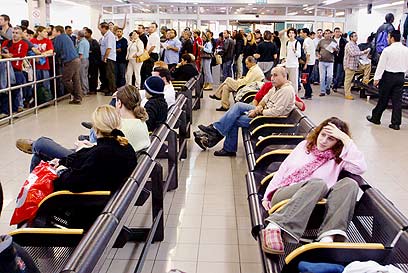
For the past couple of weeks, the web has been "aflutter" over the recent "ordination" of Sara Hurwitz, the Madricha Ruchanit (spiritual advisor) for the past five years at the Hebrew Institute of Riverdale. Ms. Hurwitz received a new title, "Maharat", which stands for Madrichah Hilchatit Ruchanit Toranit - or "Spiritual Halachic Torah Guide/Advisor."
I've been mulling this post for a while, because it's not a simple one to write. It encompasses a broad range of Jewish issues that our community struggles with, and will continue to grapple with into the near future.
What the Heck is a Maharat?Simply put, Rabbi Avi Weiss of the Hebrew Institute (and the founder of Yeshivat Chovevei Torah) made it up. It really doesn't mean anything. It's not a recognized professional title, nor does the it have any real meaning in Jewish life or practice. The Modern Orthodox world has worked itself into a lather because of what it perceives Rabbi Weiss wanted to do, would have done - and maybe even thinks he did: ordain the first female Orthodox rabbi. (Why didn't he if he did? Because had he, he would have put
his yeshiva out to pasture.) Want to know if she's a "rabbi" or not? Watch
this video and decide for yourself. (Did you even know there was something called "The Jewish Channel?")
Better Question: What is a Rabbi?The real problem here lies in our confusion about what a rabbi really is? What makes him a rabbi? His semichah? The fact that he rules on halachic matters? His fantastic speeches? In fact, the rabbinate - at least in the Modern Orthodox world - has grown to encompass far more than the community rav of old. And that's not a bad thing. But must those tasks remain in the domain of men alone? Let's list some of the functions that I performed during my tenure as rabbi of shuls in America, and evaluate whether mainstream Othodoxy would object to a woman performing these functions:
Speaking: as a rabbi, I gave a lot of speeches. I spoke both in shul and outside of it, during religious functions and after them. I spoke at personal s'machot, at funerals, parties, celebrations, memorials - you name it.
Could a woman do it? Depends. Most Orthodox shuls (other than the HIR and a limited few others) would frown on having a woman speak from the pulpit during services. But almost none would object to a woman speaking after services, even in the sanctuary, at a bat mitzvah, for example. Women also speak at funerals, bar mitzvahs, and every other type of Jewish event.
Teaching: I taught a lot, giving numerous classes in shul and throughout the community on a wide range of topics to groups, individuals, pairs - whoever wanted to learn. (Not surprisingly, this was my favorite part of the rabbinate.)
Could a woman do it? Of course - and they do teach to both men and women around the world.
P'sak halachah: I answered questions relating to Jewish law when asked.
Could a woman do it? They already do. There are numerous, qualified
yo'atzot halchah working in communities across the world. There's no reason why they should be limited to areas of women's issues and the laws of Niddah. If a woman can master the myriad rules of Niddah, she certainly can handle the complexities of kashering a kugel pan.
Visiting the sick, counseling the confounded, comforting the bereaved: Put these - and many other rabbinic functions - under the title of "social services" which have somehow found their way into the rabbinic repertoire. While certainly meaningful and critical functions, nothing about them seem "rabbinic" in nature.
Could a woman do it? Most of the bikkur cholim societies I know about are run by women. Women already serve as counselors in numerous capacities across religious society. Of course they could, as well they should.
Coordinating shul programming, running functions, serving as the synagogue mashgiach: This took up a bunch of my time; writing the d'var Torah for the shul newsletter, editing the calendar, planning programs, sitting in meetings and setting the schedule.
Can a woman do it? Certainly. In my last shul, we actually created a position of "family educator" capably handled by a woman from the community.
Attending minyan, leading davening, layning, etc: I was expected to be at minyan whenever possible, which ended up being pretty much always. I could layn on Mondays and Thursdays in a pinch, but almost never davened from the amud during the week.
Could a woman do it? She wouldn't count for the minyan, of course. She couldn't layn either. But she could still be there. And judging from the time that I used to arrive at shul (always 5 minutes late), they didn't need me for the minyan either. And if there was trouble getting a minyan, while she could never be the "tenth man", she might have an easier time getting the tenth man to show up during those frantic phone calls (which were perhaps the most unpleasant aspect of my rabbinic duties in West Hartford. I hated making those calls.
Riinnnng. Riinng. Hello? Hey Sy, it's Rabbi Spolter. [louder] Spolter, the rabbi. At Agudas Achim. Yeah, I know it's early. Listen, would you be able to get down here and help make a minyan? How many do we have? Nine - you're the tenth. [never true - but you had to say so.] Ten minutes? [also never true.] Sure, that would be great. Thanks Sy.)
The Unspoken Sexual Bias in Orthodox JudaismIn all honestly, we really don't treat women fairly in religious circles. I'll give two examples. When my father died, leaving my mother to care for seven children as an educator, she learned to negotiate for her salary. I don't want to give the wrong impression: the schools she taught in were, to the best of my knowledge, as generous as they could be, and have always treated her well. But they also often would give additional titles, roles, and of course salary to her male counterparts - rabbis. When she would ask for similar treatment she would be told, "Well, they're the head of the household, and they need to provide for their families." That's hardly comforting to a widow.
My wife Rena teaches at Midreshet Moriah, a wonderful seminary in Jerusalem. The girls call everyone there by their first names - that's just the way they do it. (We can leave that issue for debate another time.) But the rabbis also get the title "rabbi," so her colleague would be "Rav Shlomo," while she's just "Rena." Now, no one imposed this system, and Midreshet is in no way discriminatory to women - anything but. But this simple reality that my wife, who has a masters degree in Jewish education and over a decade of teaching experience - lacks a title that her male counterparts benefit from - puts her at a disadvantage from the perspective of stature and authority. Her students respect her and trust her. But doesn't she deserve a title that would express that respect the same way a man does?
So What's the Big Deal?If a woman learns the same material as a man does, should that achievement not have a form of recognition? If a woman can actually do all the things that a man could within the shul structure - and if a shul was willing to wait until after shul ended for the female spiritual leader to speak, and didn't need her for the minyan (not all male rabbis go to their own shul for minyan either), then why should we get so upset if a shul wants to choose a female to serve the needs of its members? By shutting out women from these positions, is it possible that we're losing some of our best potential candidates, full of spirit and desire and energy and passion - qualities critical in successful rabbis? Why does the vast majority of Orthodoxy reject ordaining female rabbis, especially if they already perform so many rabbinic functions?
It Is a Big DealModern Orthodoxy - in whatever flavor you choose - "Centrist," Religious Zionist, YU, whatever -- finds itself in an eternal struggle to try and juggle two conflicting, sometimes contradictory values. On the one hand, we pledge allegiance to the Torah; not simply to technically fulfill the dry dictates of halachah, but to uphold and preserve the values, truth and lifestyle inherent in the Torah as well. At the same time though, we use those values as a guide to help navigate the modern world. Rather than reject confrontation with cultural, human and scientific advancement and hide within a self-imposed exile, we embrace the complexity of the outside world, despite the difficult challenges it presents and attempt to live Torah lives.
These values have greatly enhanced Jewish life; they spurred the building of the State of Israel. They have achieved incredible advances in the human condition, banishing slavery, oppression and discrimination to the dark underside of humanity. But that same world which has uncovered a great deal of light also spreads too much darkness. Rampant sexuality plagues our modern culture, left unchecked by any semblance of decency or appropriateness. Modernity advocates wholesale abandonment of faith, and rejects and mocks religion in favor of a total devotion to the religion of science. This leads to a relativistic sense of values, ungrounded in anything but the latest fad of decency.
So engagement with modernity comes with a price, when the values of modernity and Torah clash. This is precisely what has happened in the area of feminism and the advancement of women.
On one hand, the advancements that women have achieved in the religious spheres have been nothing short of amazing. Gone are the days where the boys received the education, and the girls stayed with the mother in the kitchen. And that wasn't that long ago. Nowadays, girls from across the religious spectrum study Torah seriously, at least through high school and even a year afterward. Women have the opportunity to study all aspects of Torah at an extremely advanced level, and in coed high schools it's not unusual for the girls to learn Gemara better than the boys. Women now take leadership roles in their shuls, and not just as the president of the sisterhood. They sit on boards, serve as officers, and in some shuls even serve as the president (as long as it's not a Young Israel shul).
And yet, for all the advancements that women have achieved, they still at some point his a "glass mechitzah." There's a point at which Orthodoxy says to its women: that's as far as you can go. Why? Because of tzniut.
Here we find the unspoken, difficult to quantify value not explicit in Jewish law, but implicit throughout. Judaism maintains that the differences between men and women are not simply physical, but manifest themselves in the roles that they take in larger society. While the notion of tzniut applies to both sexes, women's tzniut applies not just in terms of the clothes that they wear, but in their roles in broader society as well. While men have obligations and requirements within the communal structure - they must pray in public; they can lead davening, serve as judges and testify in court, women have none of these obligations nor the rights that come with them. These facts are built into the halachic system: a woman does not count in a minyan; she cannot preside over a Jewish court of law; she may not testify (under many circumstances) in that court either, and she cannot lead public prayer. All of these points create a larger picture of differing roles within the Jewish framework, where men take on a more public persona, and the women occupy a more private, modest role within the household.
All of this leads to the issue of female Orthodox rabbis: If we apply halachic rules at face value only without looking for a deeper pattern, there's no specific law that prohibits a woman from performing any of the roles I listed above. And, for that matter, it's difficult to argue that halachah prohibits a woman from serving as a "rabbi" - or maharat.
But when we frame our worldview based on the ideology behind the halachot that guide our lives, then a female rabbi becomes an oxymoron - an impossibility within a halachic framework, for a very simple reason.
In addition to all the tangible roles and tasks that a rabbi performs in his day to day duties, there's one other aspect to the job that's difficult to quantify, but critical for rabbnical success. A rabbi must be a leader. In fact, I believe that the term "rav" - the Hebrew word for rabbi - implies a sense of greatness, authority and leadership inherent in the role. Sure, anyone can teach. But what does the rabbi teach about? What are the goals of his speeches? Are they enlightening and entertaining and fluffy? Or does the rabbi take positions - sometimes unpopular, sometimes downright antagonistic to his members - but geared to push his community in the direction he believes will bring them closer to God? And it's that leadership; the need to stand before a community, put his foot down, and say, "This is the way it has to be," that defines what it means to be a rabbi. And that's not a role for women within the framework of traditional Judaism.
 I saw this comic which informed me that the Matrix came out in theaters 10 years ago this month. I smudged out some adult language in the comic, from this site. In any case, April 2nd marked the tenth anniversary of the release of the Matrix, which I consider a very important science fiction film - mostly because it contains what I consider to be a great deal of truth.
I saw this comic which informed me that the Matrix came out in theaters 10 years ago this month. I smudged out some adult language in the comic, from this site. In any case, April 2nd marked the tenth anniversary of the release of the Matrix, which I consider a very important science fiction film - mostly because it contains what I consider to be a great deal of truth.

















